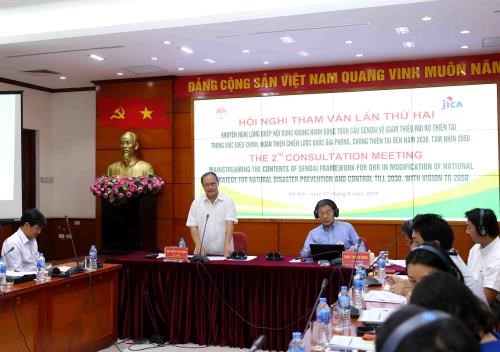ID :
496547
Fri, 06/29/2018 - 04:30
Auther :
Shortlink :
https://oananews.org//node/496547
The shortlink copeid
Vietnam looks to integrate UN Sendai Framework into national strategy

Hanoi, June 29 (VNA) – Vietnam has built six prioritised programmes for natural disaster prevention, which include key contents of the UN Sendai Framework for Disaster Risk Reduction, heard a consultation session in Hanoi on June 27.
The session, the second of its kind, was organised by the Vietnam Disaster Management Authority, Ministry of Agriculture and Rural Development and the Japan International Cooperation Agency (JICA) to collect recommendation on integrating contents of the Sendai Framework in Vietnam’s national strategy on natural disaster prevention and control by 2030 with a vision toward 2050.
The Sendai Framework for 2015 – 2030 was adopted by UN member states in 2015 at the 3rd UN World Conference on Disaster Risk Reduction in Sendai City, Miyagi Prefecture, Japan. It set out seven targets and four priorities for action, aiming at substantial reduction of disaster risk and losses in lives, livelihoods and health of persons, businesses, communities and countries.
Reports at the function showed that based on the country’s situation and the Sendai Framework’s targets, Vietnam has been focused on efforts to reduce economic losses due particularly to storms, floods and droughts, via investment in natural disaster risk mitigation.
The six prioritised programmes deal with capacity building for central and local public agencies and communities; management system for natural disasters data; designing relevant plans for different levels of authorities; comprehensive risk mitigation for storms, floods, and droughts; preventative measures for flash flood and landslide; production and livelihoods restructuring for sustainable development of the Mekong Delta in response to climate change.
Deputy Minister of Agriculture and Rural Development Hoang Van Thang said more work is needed to complete institutions, policies and laws in order to improve effectiveness of natural disaster prevention.
He noted that so far most attention has been paid to response investment instead of mitigation solutions, adding that many risks come from unsustainable development, citing the examples of infrastructure projects that increased disaster risks.
Concerning Vietnam’s prioritised programme for the Mekong Delta, JICA expert Tachi Kenichiro recommended changing the mindset from living with floods to proactively living with floods, inundation and saltwater intrusion.
All types of investments should be accompanied by changes in lifestyle to adapt to new environmental conditions caused by climate change, he suggested, adding that consistent planning and implementation of measures on river water management are also necessary.
An integrated multidisciplinary approach should be used to design a master plan for the region’s sustainable development in adaptation to climate change toward 2030 with a vision toward 2050, the expert noted.
He also advised the region to upgrade its tracking system for climate change and sea level rise, to update local climate change scenarios and to increase investments in projects to drain floods, control salt intrusion and landslide and protect mangrove forests.
Attention should also be paid to the integration of projects from different sectors and the rearrangement of residential areas and riverside infrastructure for disaster risk reduction, he added.
Takeya Kimio, technical adviser for the JICA President, said since the formation of the Sendai action framework, Vietnam has made efforts to improve its natural disaster resilience.
JICA wants to access information on Vietnam’s high-level strategy based on the framework, he stressed.
According to the expert, in the first five years of Vietnam undertaking the framework, JICA will support the country in completing relevant institutions and designing and implementing action plans.
The assistance will continue afterwards in strengthening the national strategy for natural risk reduction and building plans at the local level./.





